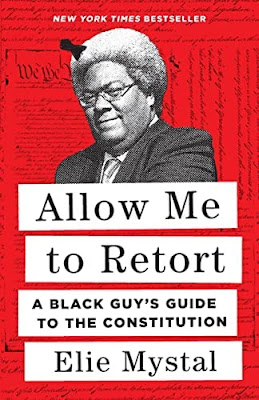 |
| Author Elie Mystal |
The arguments for Constitutional originalism and absolutism are enshrouded in doublespeak and intentionally confusing verbal maneuverings that it becomes difficult to sustain reasoned and rational arguments in favor of civil and social rights. Conservative pundits have claimed moral and legal domain over the rights protected by the Constitution. To counter these arguments, Harvard Law graduate, legal commentator, and writer Elie Mystal has compiled a collection of essays centering on the experiences of disenfranchisement among women, people of color law, LGBTQIA+, and others from marginalized communities in Allow Me To Retort: A Black Guy’s Guide to the Constitution. Through a review of history and case law, Mystal shows evidence of a U.S. legal system built upon preserving patriarchy, heteronormativity, and White supremacy.
Mystal directly confronts the hypocrisy and fallacy of right-wing arguments regarding hot-button issues such as police brutality, cancel culture, the right to bear arms, reproductive rights, voter suppression, and more. True to his unapologetic MSNBC persona, Mystal does not mince words nor strike a conciliatory tone. He makes his argument in a cognitively accessible way and uses minimal legal jargon. He shares personal anecdotes about downright scary encounters with police, then spends a great deal of time breaking down Fourth Amendment to expose the flaws of legal arguments that uphold police brutality and White supremacy in law enforcement.
Mystal showcases his legal training and knowledge of case law to explain the historical civil, social, and political ramifications of interpretations of the law at the hands of racist judges. Despite the pervasive American myth of the objectivity of the law, Mystal proves that it is applied subjectively, often to benefit the status quo of White male hegemony. Anyone with a cursory interest in how the law and politics merge to uphold inequities would appreciate Mystal’s nuanced take on how the law has been weaponized against vulnerable communities.
 |
| Buy from Capital Books |